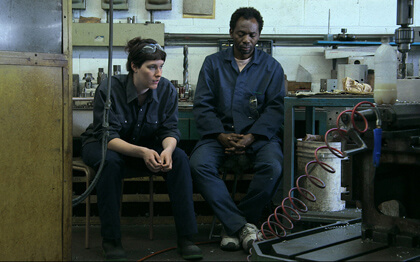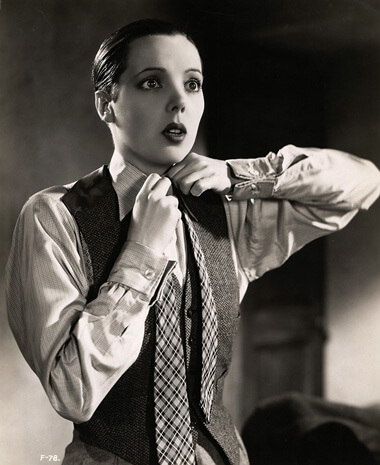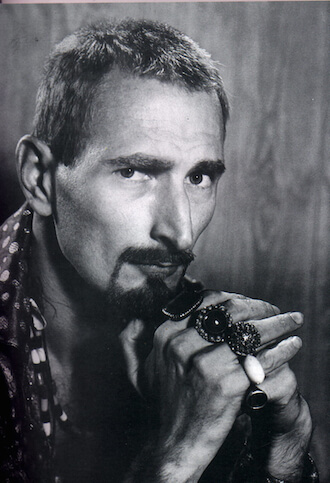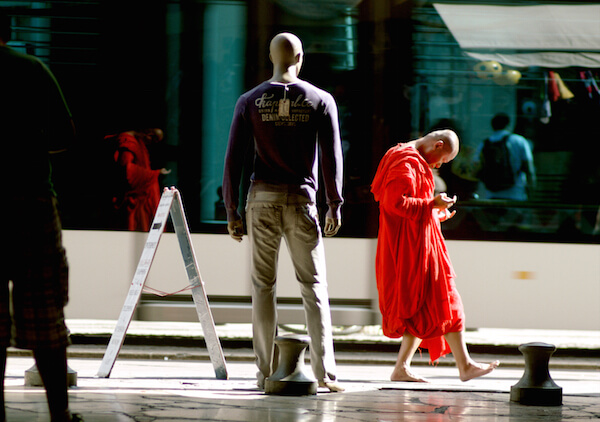A factory scene in Denis Côté’s “Joy of Man’s Desiring.” | FILMS BOUTIQUE
BY STEVE ERICKSON | Joy of Man’s Desiring” confirms my impression that Denis Côté is the most talented Canadian director to emerge since Guy Maddin. He’s also one of the hardest to pin down. He seems to alternate between relatively conventional narratives (like “Vic + Flo Saw a Bear,” which played Anthology Film Archives last winter) and flirtations with documentary. “Bestiaire” is the closest he’s come to making a straightforward doc, but its appearance is deceptive. At a Q&A session, the director revealed that he fiddled with the sound in post-production and tried to make the animals he filmed at a Montreal zoo appear more agitated than they actually were. Simultaneously, he denied any sympathy with animal rights activists or any political agenda.
“Joy of Man’s Desiring” goes from the zoo to the factory floor and finds a whopping dose of boredom and alienation, but also a great deal of fascinating imagery. This is closer to a Stanley Kubrick film than Bruce Springsteen’s dirge “Factory.”
“Joy of Man’s Desiring” opens with a woman speaking to another person, who remains unseen. That person seems to be a co-worker, and the speech is extremely ambiguous. From there, Côté’s film goes into a long, dialogue-free stretch that concentrates on the presence of machines operating automatically. Eventually, it returns to people speaking, but about 45 minutes pass before we see the woman from the opening scene again. The factory setting is real, but Côté cast actors to fill it, at least partially. His dialogue is deadpan and often quite funny, as when one worker speculates on a gay affair between Prince Charles and the king of Morocco.
Denis Côté explores the intriguing imagery overlaying a factory’s monotony
Now that almost all movies are shot on high-definition video, it may not mean much to say “Joy of Man’s Desiring” is particularly suited to the medium. Yet it recalls films shot in the early days of HD, like Michael Haneke’s “Caché” and Jia Zhang Ke’s “Still Life.” The cinematography has a crisp gloss that brings out white tones in the factory backgrounds. Côté rarely moves the camera, relying on zooms instead to vary the film’s rhythm. One worker talks about encountering dust and oil in her first day of factory labor, but the factories we see are almost antiseptic. Côté knows how to bring out a creepy, near-institutional quality in them.
“Joy of Man’s Desiring” is unabashed about aestheticizing work that may be a dull grind for factory laborers. Côté makes the processes of grinding coffee beans and operating an industrial laundry intriguing to watch. Most of us would probably prefer not to work in such places, but where would our morning routines be without clean sheets and coffee? The fact that factory work is rapidly leaving North America for cheaper overseas locales hovers over “Joy of Man’s Desiring” and lends an edge of desperation to the film and its characters, especially a woman who goes around praying for work.
Côté has created an observational work that finds both beauty and pain in the factory. He’s frank enough to acknowledge the former, mostly in the first half, but the film’s second half makes clear what a drag work can be. One worker tells a story about a crooked landowner who hires people to till his land for two dollars. The catch is that they can’t get paid unless they can make him say “aah” and “eee.” One clever man manages to defeat him by getting him bit by a scorpion and a spider. No one is physically hurt by their labor in “Joy of Man’s Desiring,” but the scorpion and spider are freighted with psychological meaning, especially in the mind of one man who’s too depressed to go on working.
Unlike Quebecois filmmakers like Jean-Marc Vallée and Denis Villeneuve, Côté seems unlikely to ever go to Hollywood or work with American stars like Jake Gyllenhaal or Reese Witherspoon. Even Xavier Dolan, who hasn’t left Canada either, has a higher profile. Côté seems content to film his surroundings: Montreal and the countryside around it. When I interviewed him last year, I discovered he’s a Quebecois nationalist, something that now seems implicit in his work.
There’s a political ambiguity to “Joy of Man’s Desiring,” however, that keeps it fresh: it’s hard to imagine a Marxist acknowledging that beauty can be found in machines pounding away — Côté recalls Italy's Futurists without their proto-fascist agenda — or a gung ho capitalist showing such a downside to factory labor. The Bach reference in the title isn't entirely ironic. Côté seems open to anything he found in the factories. Even his fictional creations ring true.
JOY OF MAN’S DESIRING | Directed by Denis Côté | Films Boutique | In French with English subtitles | Opens Jan. 16 | Anthology Film Archives | 32 Second Ave. at Second St. | anthologyfilmarchives.org






































